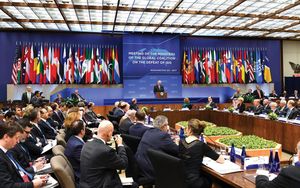WASHINGTON – For North American companies, the “wait and see” moment on tariffs is over. US President Donald Trump imposed a 25 percent levy on goods from Canada and Mexico, along with a 10 percent tariff on goods from China, marking what could be the opening stages of a full-scale trade war. This development is likely to create new headaches for executives who have been grappling with rising costs for several years.
The tariffs on goods imported from the US’ three largest trade partners are set to disrupt industries ranging from automotive to consumer goods and energy. Until now, executives have largely deflected questions about tariffs following the February 1 announcement, aiming to avoid aggravation of Mr. Trump’s White House. But this non-response may no longer be feasible.
“All CEOs are bewildered by these non-strategic tariff tantrums being directed at our closest allies instead of adversaries,” said Professor Jeffrey Sonnenfeld, who teaches at the Yale School of Management. This sentiment captures growing discontent within the business community over the administration's trade policies.
Numerous global companies are scheduled to report results this coming week, including giants such as Amazon, Ford Motor, Mondelez International, and Owens-Illinois. These companies are likely to face relentless inquiries concerning their strategies for mitigating increased costs stemming from tariffs.
The US Steelworkers union—North America’s largest industrial union—expressed strong opposition to Mr. Trump’s tariffs on Canada, emphasizing the substantial $1.3 trillion trade flow between the two nations. “These tariffs don’t just hurt Canada. They threaten the stability of industries on both sides of the border,” stated union president David McCall.
Meanwhile, automakers such as General Motors and Toyota might reconsider their production strategies, with potential shifts from foreign facilities back to US soil. Corporations like Alcoa, one of the largest aluminum producers, have already indicated they may reroute shipments to downsize tariff burdens.
Ahead of Mr. Trump’s return to office, many companies hastened their shipments during the fourth quarter, perhaps anticipating the impending tariffs. For smaller businesses without global operations, offsetting these tariffs remains considerably more challenging, especially when foreign components are integral to their supply chains.
Many aerospace and automotive manufacturers are located near the US-Canada border, with US oil refiners heavily relying on Canadian crude oil as well. Despite Mr. Trump’s oft-repeated assertions to the contrary, tariffs are paid by importing companies, not foreign governments.
This past week, Mr. Trump acknowledged potential short-term disruptions caused by the tariffs, acknowledging the possibility of consumers facing increased prices. He has pursued tariffs as part of his strategy to incentivize companies to bring operations back to the United States, prompting frustration among firms who had previously shifted production to Canada and Mexico following prior tariffs on China.
Matt Blunt, president of the American Automotive Policy Council—which advocates for automakers like Ford and GM—voiced concerns about the competitive disadvantages these tariffs impose: “Our American automakers... should not have their competitiveness undermined by tariffs which will raise the cost of building vehicles in the US and stymie investment in the American workforce.”
Research suggests higher tariffs tend to translate to elevated checkout prices, but the exact financial impact remains unclear. Experts warn businesses might absorb some of the tax burden, but the consumer goods sector is bracing for affectations.
Tom Madrecki, vice-president of supply chain resiliency at the Consumer Brands Association, remarked, “the consumer packaged goods industry supports a strategic ‘America First Trade Policy’... Nonetheless, tariffs could lead to increased prices,” urging both Mexico and Canada to collaborate with Mr. Trump to avert economic fallout.
Industry giants such as Walmart and Target are already struggling to maintain low prices amid rising inflation, potentially facing additional strain from increased supply chain costs. Neither company has issued direct commentary concerning the tariffs. The National Retail Federation, representing the largest retailers across the nation, has recommended the White House pursue alternative strategies to accomplish its policy goals without imposing universal tariffs. NRF executive vice-president David French stated, “as long as these universal tariffs are in place, Americans will be forced to pay higher prices on everyday consumer goods.”
Church & Dwight, known for products like Arm & Hammer detergent and Trojan condoms, announced it would concentrate on local manufacturing and enhancing productivity to counter the effects of tariffs. “These are volatile situations, so we’ll see how long it lasts and what happens,” said CFO Rick Dierker during the company's earnings call on January 31, adding they have the capacity to be “reactive when we need to be.”
The imposition of tariffs by the Trump administration signals challenging times for businesses and consumers across North America, leaving many to ponder the potential impacts on trade relations and overall economic stability.



